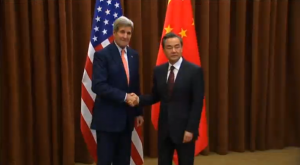
MAY 16 (Reuters) — U.S. Secretary of State John Kerry has urged China to take action to reduce tension in the South China Sea and expressed concern about the pace and scope of Beijing’s land reclamation in the disputed area.
Kerry, speaking at a joint news conference with China’s foreign minister, Wang Yi, said China and the United States were committed to finalizing a deal that would block paths for Iran to obtain fissile material.
Kerry spoke at the start of a two-day China tour dominated by deepening security concern about China’s maritime ambitions in the South China Sea.
On Saturday, May 16, Kerry met his Chinese counterpart in Beijing amidst simmering tensions over disputed areas of the South China Sea.
Kerry, who is on a two-day visit to China officially to advance U.S. priorities ahead of the Strategic and Economic dialogue in Washington later in the year, shook hands with Foreign Minister Wang Yi before the two sides sat down to discussions.
Kerry’s agenda is likely to be dominated by the issues of Chinese land reclaimations and freedom of passage in the South China Sea, as concerns from U.S. and Philippine officials mount that China is planning to declare an Air Defence and Identification Zone (ADIZ) over the disputed Spratly Islands.
The U.S. Secretary of State is expected to take China’s rapid reclamation effort around seven reefs in the Spratly archipelago of the South China Sea has alarmed claimants such as the Philippines and Vietnam.a tough line on the issue, with a senior State Department official saying on Wednesday (May 14) that Kerry would leave China “in absolutely no doubt” about Washington’s commitment to ensuring freedom of navigation and flight in the South China Sea.
The official added that Kerry would warn that China’s land reclamation work in contested waters could have negative consequences for regional stability – and for relations with the United States.
Beijing claims sovereignty over most of the South China Sea, through which $5 trillion in ship-borne trade passes every year. The Philippines, Vietnam, Malaysia, Taiwan and Brunei have overlapping claims.
China has been carrying out land reclamation and construction projects at eight military outposts in the South China Sea, U.S. Admiral Samuel Locklear told a congressional hearing last month. The work involved “fairly massive” reclamation in the Spratley archipelago and upgrades to facilities in the Paracel Islands, he said.
The building work in the Spratleys included what was presumed to be an airfield on the Fiery Cross Reef, Locklear said.
Recent satellite images also show reclamation work on Subi Reef creating landmasses that, if joined together, could make space for another airstrip.
For its part, China has said it has every right to set up an ADIZ but that current conditions in the South China Sea did not warrant one. Beijing also accused the Philippines of working together with the United States to “exaggerate the China threat” over the disputed Spratly Islands.







